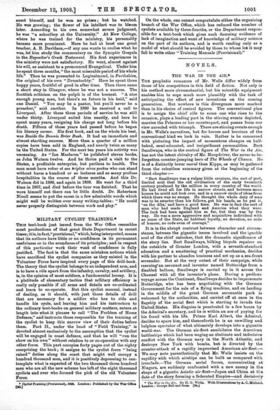"IAN MACLAREN."f
THE world certainly has reason to be thankful for the com- bination of antecedents and surroundings which made John Watson what he was. Sometimes the contradictions which resulted are strange in the extreme. That a Presbyterian minister to whom the Covenant must have been something of a sacred thing, and who would hardly have given a harsher name than enthusiast to a Cameronian, should have been a Jacobite is a curiosity. " He could tear the claims of the Stuarts -in pieces," but his logic was overpowered by the cadences of a Jacobite song. He was, in fact, an ideal senti- mentalist. If anything could rid the word of the reproach which seems to cling to it, it would be to see what breadth of sympathy, what kindliness, what generosity of act and thought, were to be found in "Ian Maclaren."
John Watson was a student at Edinburgh Univer- sity when it had a more than usually distinguished company of Professors, J. S. Blackie; Seller, P. G. Tait, and David Masson among them. He did not particularly Toys of Other Days. By Mrs. F. 141411 Jackson. London : Country Life. [214.] t " ran Maclaren " : Life of the Bee. John Watson. D.D. By W. Robertson Nicoll. London : Hodder and Stoughton. [ile.] exert himself, and be won no prizes ; but he watched. He was growing; the flower of his intellect was to bkom later. According to his own somewhat severe judgment, be was "a schoolboy at the University." At New College, where he was trained for the ministry, his personality became more prominent. Here he had at least one great teacher, A. B. Davidson,—if any one wants to realise what he was, let him study the commentary on the Synoptic Gospels in the Expositor's Greek Testament. His first experiences in the ministry were not satisfactory. He went, almost against his will, as assistant to a pronounced Evangelical. Under him he spent three months," the most miserable period of his whole life." Then he was presented to Logiealmond, in Perthabire, the original of his own " Drumtochty." Here he spent three happy years, fruitful of good in after time. Then there came a short stay in Glasgow, where he was not a success. The Scottish criticism on the pulpit is of the keenest. " A nice enough young man, but there's na future in his heid," said one Daniel. " You may be a pastor, but you'll never be a preacher," said another. In 1880 he received a call to Liverpool. After these three periods of service he was still under thirty. Liverpool suited him exactly, and here he spent many years, resigning his charge not long before his death. Fifteen of these years had passed before he began his literary career. His first book, and on the whole his best, was Beside the Bonnie Brier Bush. It had an immediate and almost startling success. More than a quarter of a million copies have been sold in England, and nearly twice as many in the United States. For the next ten years his activity was unceasing. As " Ian Maclaren" he published eleven books, as John Watson twelve. And he thrice paid a visit to the States, a profitable enterprise, but perilous to health. The man must have robur et aes triplex circa pectus who can stand without harm a hundred or so lectures and as many profuse hospitalities in the course of three months. And this Dr. Watson did in 1896, and again in 1899. He went for a third time in 1907, and died before the tour was finished. That he wore himself out there can be little doubt. Dr. Robertson Nicoll seems to put the cause in a few admirable words which might well be written over many writing-tables: " He could never properly distinguish between work and play."































































 Previous page
Previous page